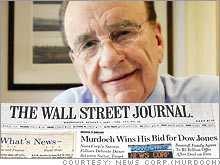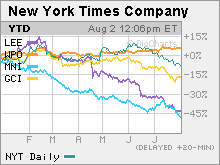Don't bet on a 'paper' chaseNews Corp.'s purchase of Dow Jones is probably not going to cause a wave of more newspaper mergers, experts say.NEW YORK (CNNMoney.com) -- News Corp.'s acquisition of Dow Jones is the latest in a flurry of newspaper deals that have taken place over the past few years. Lee Enterprises bought Pulitzer Inc. in 2005. McClatchy bought Knight Ridder last year. And Tribune is attempting to go private in a deal led by Chicago real estate mogul Sam Zell.
But several publishing industry watchers said the News Corp.-Dow Jones deal may mark the end of newspaper consolidation, not an ushering in of even more mergers. That could be bad news for investors of the few remaining big publicly held newspaper companies, such as The Washington Post (Charts), The New York Times (Charts), McClatchy (Charts) and Gannett (Charts, Fortune 500). Newspaper stocks have slumped this year, with the one exception being The Washington Post. After all, News Corp.'s interest in Dow Jones (Charts) doesn't necessarily mean that News Corp. sees great things ahead for the newspaper industry. Instead, the acquisition was mainly an outgrowth of News Corp. (Charts, Fortune 500) chairman and chief executive officer Rupert Murdoch's long-held desire to own The Wall Street Journal, a yearning that had taken on more urgency now that News Corp. is launching a cable business channel in October to compete with GE-owned CNBC. "This is an aberration. I wouldn't even lump the Wall Street Journal and Dow Jones in with other newspaper companies," said Reed Phillips, managing partner with DeSilva & Phillips, a media investment bank based in New York. "The characteristics of the Journal are quite a bit different from other daily newspapers. It's a national business publication and that's why Murdoch wanted it." Larry Grimes, president of W.B. Grimes & Company, a Gaithersburg, Md.-based investment bank that also focuses on the media industry, agreed. "You can't compare Dow Jones to any of the traditional newspaper publishers. It's a totally different type of newspaper and brand," Grimes said. Simply put, the growth trends for print are not promising and it's a relatively expensive business to run as well. "One of the big challenges in the newspaper industry is that young people don't read newspapers. Plus there are tremendous fixed costs, such as the price of gasoline, which affects distribution costs, that newspaper companies have no control over," said John K. Hartman, a journalism professor at Central Michigan University. What's more, experts said that even if there were many interested parties eager to buy newspaper companies, it would now be much tougher to finance a deal given the problems in the credit markets. In fact, there has been talk that the Tribune (Charts, Fortune 500) deal is at risk of falling apart as investor appetite for corporate bonds has waned. "One reason Dow Jones-News Corp. won't be a trigger for a major new round of media mergers is because there are problems in the debt markets," said James Owers, a professor of finance at the Robinson College of Business at Georgia State University. Owers added that if there was legitimate interest in newspaper companies, the Bancroft family that controls Dow Jones, which was wary of selling to Murdoch before finally relenting, would have been able to get someone to top the News Corp. offering price. "The Bancrofts had three months to go through a ritualistic round of finding counter offers, and nobody else stepped up," he said. Phillips also pointed out that private equity investors simply aren't willing to invest in this industry right now. So even if a newspaper publisher wanted to go private, it would be difficult to do so. "I do think publishers will all look at whether to go private and examine that option closely. But doing so will require a lot of money and private equity guys are leery of newspapers," he said. So if anything, Phillips said big publishers will probably wind up needing to be active buyers instead of sellers. He said newspaper companies are more likely to keep buying online media assets to offset the erosion of advertising dollars and circulation revenue as more readers migrate from print editions of newspapers to online versions. "There is a lot of anxiety about the future of print. So far, digital revenues are growing fast but not fast enough to replace lost print advertising revenues," he said. "The most likely scenario for the major publishers is they'll hunker down and focus on their digital strategy." But eventually, some companies could face pressure to sell, even if it is for a depressed price. Grimes noted that institutional money manager Ariel Capital Management and hedge fund Citadel Investment Group have both boosted their stakes in McClatchy recently, a move that he called "curious." And Hartman said he would not be surprised if years from now, Murdoch made a run for Gannett, if for no other reason than he would be able to cut costs by combining the national distribution operations of The Wall Street Journal and Gannett's USA Today. But Hartman added that he also wouldn't be shocked if Murdoch eventually soured on Dow Jones and dumped it, similar to what he did with TV Guide nearly a decade ago and with News Corp.'s stake in satellite television company DirecTV, which was sold to Liberty Media earlier this year. "Two or three years down the road, after the cable business channel has been established, Murdoch may decide he no longer needs the company. That's his history," he said. |
Sponsors
|




